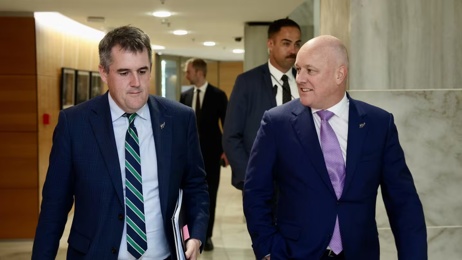Parliament will return for the first time since before the election next week, with the first piece of legislation before the House to be a bill designed to refocus the Reserve Bank on reducing inflation.
This is the first legislative item on the Government’s 100-day plan, announced by Prime Minister Christopher Luxon in his first post-Cabinet press conference yesterday. Luxon described the plan as “ambitious”.
“Frankly that is because we are ambitious for New Zealand,” he said.
The Labour Government had given the bank a dual mandate to focus on both maximum sustainable employment and keeping inflation between 1-3 per cent. National has alleged this had distracted the bank from a strict focus on inflation. In reality, the bank has itself admitted that its actions would have been much the same with or without the employment mandate.
The 100-day plan includes promises to deliver on key, large promises from the new Government. The Labour Government’s two massive RMA reform laws will be repealed, and the old RMA reinstated before Christmas. Also destined for the bin are Labour’s Auckland light rail scheme, Government participation in Let’s Get Wellington Moving, the Lake Onslow pumped hydro scheme, fuel tax hikes, fair pay agreements, and the clean car discount (or “ute tax”).
Things like repealing the Auckland regional fuel tax, and Labour’s Three Waters scheme will take longer, with National pledging only to introduce legislation to get rid of those policies in the first 100 days, rather than promising to repeal them outright. This is understandable, given the tight timeframe, which includes the Christmas break.
Leader of the House Chris Bishop said the House would begin sitting next week, and each of the remaining weeks before Christmas. He said the ball was in Labour’s court as to when Parliament would rise on the final week of the year. Parliament traditionally adjourns on the Wednesday of the final week of the year, but the Herald understands National wants to run right until Friday, December 22.
“The exact time the House will lift will be over to the Opposition, and we will see how we go,” Bishop said.
Peters’ comments about the Public Interest Journalism Fund and false claims media had been bribed, Luxon refused to condemn them. He said that he and National had not agreed with the fund either.
He said Peters’ comments were “not the way I would have expressed it” but that he was “frustrated” by the fund as well.
Luxon said he thought it had led to perceptions of bias “rightly or wrongly”.
He thought Peters’ comments to RNZ and TVNZ around their use of te reo Māori were not directions.
Asked about Hipkins’ comments today that Luxon needed to “rein in” Peters, Luxon said he didn’t listen to Hipkins.
“He’s a desperate man at the moment.”
Labour has a big day of its own on Thursday, when leader Chris Hipkins has said he will announce Labour’s refreshed line-up. Unlike in Government, when only ministers have portfolios, Labour will now give all of its MPs policy portfolios.
Observers cocked an eyebrow at some of the measures on the 100-day list, which included a governmental double-tapping of schemes that had already been killed by the previous Government. The plan included a NZ First promise to stop work on He Puapua, a report that was finished and delivered to the Labour Government in its first term as part of research on implementing the United Nations Declaration on the Rights of Indigenous Peoples (UNDRIP).
He Puapua was written for the Government when Peters was last in office, though he now alleges Labour hid it from him. Work stopped on the report after it was delivered to ministers. Māori Development Minister Willie Jackson was tasked with implementing the Government’s response to UNDRIP, but he stopped work on that prior to Dame Jacinda Ardern leaving office.
The plan also says National will scrap Labour’s prison population reduction target, something former Corrections Minister Kelvin Davis himself scrapped on the campaign.
On the campaign, National launched its party’s 100-day plan saying New Zealanders had “waited six long years” for a Government that “focuses on what matters to them”. However, the plan National has delivered in Government includes culture war-derived diversions on the likes of lodging a reservation against adopting amendments to WHO health regulations”. This must be done in the next two days, making it one of the most urgent of the actions in the plan - ahead of restoring the Reserve Bank’s single mandate.
/cloudfront-ap-southeast-2.images.arcpublishing.com/nzme/FV4KTF7GOBDTJNQH2T74CLGJQA.jpg) Green Party co-leader Marama Davidson described the plan as “visionless, and harmful grab bag of policies”. Photo / Sylvie Whinray
Green Party co-leader Marama Davidson described the plan as “visionless, and harmful grab bag of policies”. Photo / Sylvie Whinray
Green Party co-leader Marama Davidson described the plan as a “visionless and harmful grab bag of policies”.
“This is not a serious Government. People deserve a Government that is serious about addressing the challenges we face right now,” she said.
One of Davidson’s MPs, Chlöe Swarbrick, is trying to get National to make good on some of its tough talk in opposition.
She wrote to the new Finance Minister Nicola Willis on Wednesday, asking her to release the “modelling and assumptions” behind its housing policies, particularly a plan to allow landlords to deduct interest costs from their tax bills, which could cost between $2.1 billion and $3b.
Swarbrick also wants the Government to publish the “distributional impacts” of the decision, showing how it affects wealthy and poor. National has said the plan would put “downward pressure” on rents, giving renters some benefit, but the party has never said it would reduce rents. The policy was designed to put a lid on house price rises by making it more costly for investors to borrow money and acquire property.
In opposition, Swarbrick and Willis forged a bipartisan friendship of sorts on the Finance and Expenditure Committee, where they pressed the Labour Government and the Reserve Bank to be more transparent about its forecasting and the effect its monetary policy of low-interest rates and digital money printing was having on households, both owners and renters alike.
“Throughout 2021, I was grateful that National under your committee leadership voted consistently each week to back my motion for an inquiry into house price forecasting assumptions made by RBNZ [Reserve Bank] and Treasury, as impacted by monetary and fiscal policy.
“When we had hearings with the governor and minister respectively, I recall you also joined me in raising the alarm about the ‘distributional impacts’,” Swarbrick said, before quoting Willis’ own words back to her.
“These decisions impact all of us - not only Kiwis paying a mortgage but savers, workers and potential home-buyers too. If these decisions are being based on inaccurate assumptions, then it’s right that we ask more questions,” Willis said at the time.
The letter was apposite, landing the day the Reserve Bank forecast for the first time since the crash that house prices are on track to rise to just above their Covid-bubble peak. The forecast did not take into account the new Government’s plan to reintroduce interest deductions and to significantly scale back Labour’s medium-density residential standards, which have enabled cities to zone for far more house building.
Comparing National’s 100-day Plan with the Government’s 100-day Plan
Tweaked:
Start reducing public sector expenditure, including consultant and contractor expenditure.
National’s plan included for public sector CEs to ‘report on current spending within 100 days’.
Introduce legislation to extend eligibility to offence-based rehabilitation programmes to remand prisoners.
This used to say simply rehabilitation programmes
Take policy decisions to amend the Overseas Investment Act 2005 to make it easier for build-to-rent housing to be developed in New Zealand.
this used to say simply to ‘amend the OIA’ not just to take policy decisions
Gone:
Start reducing public sector expenditure by 6.5% on average by requiring Chief Executives to identify back-office spending not critical to frontline services.
Establish a permanent Rural Regulation Review Panel to assess all regulations affecting the primary sector and propose solutions to cut red tape.
New:
- Stop work on Industry Transformation Plans.
- Start work to improve the quality of regulation.
- Begin to cease implementation of new Significant Natural Areas and seek advice on operation of the areas.
- Abolish the previous Government’s prisoner reduction target.
- Begin to repeal and replace Part 6 of the Arms Act 1983 relating to clubs and ranges.
- Stop all work on He Puapua.
- By 1 December 2023, lodge a reservation against adopting amendments to WHO health regulations to allow the government to consider these against a “national interest test”.
- Begin work on delivering better public services and strengthening democracy.
- Repeal amendments to the Smokefree Environments and Regulated Products Act 1990 and regulations
- Allow the sale of cold medication containing pseudoephedrine
- Begin work to repeal the Therapeutics Products Act 2023
Thomas Coughlan is deputy political editor and covers politics from Parliament. He has worked for the Herald since 2021 and has worked in the press gallery since 2018.
Take your Radio, Podcasts and Music with you









